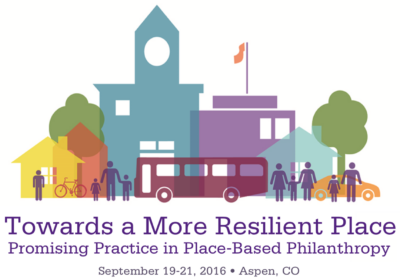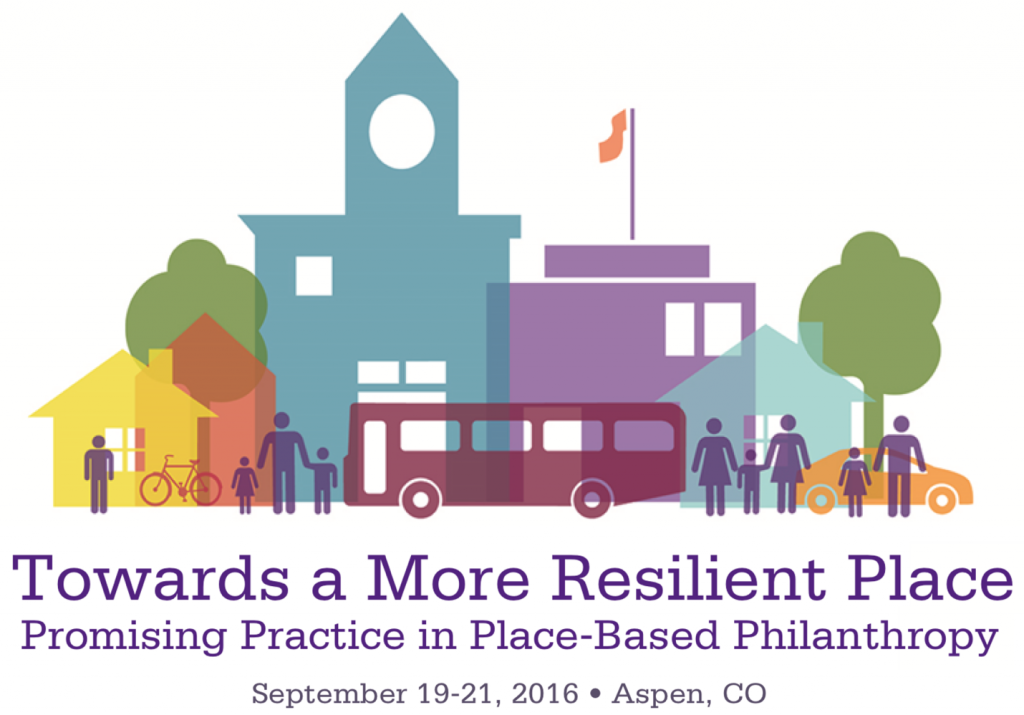
Last month, the Aspen Institute Forum for Community Solutions and Neighborhood Funders Group convened 100 local, regional, and national funders for Towards a More Resilient Place: Promising Practices in Place-Based Philanthropy. This convening builds on our 2014 Towards a Better Place convening and our 2015 convening with the Jacobs Center for Neighborhood Innovation, Is This a Better Place?, all intended to explore best practices in funding place-based community change.
 |
 |
By Dennis Quirin, President of Neighborhood Funders Group, and Steve Patrick, Executive Director and Vice President of the Aspen Institute Forum for Community Solutions
As place-based efforts in philanthropy continue to expand, the time is ripe to rethink the role of funders in supporting community resilience, cohesion, and community power building. The convening set out to explore answers the questions: What does a “successful community” look like, using the resiliency frame? What will it take to transform the power paradigm between grantees and funders in supporting authentic resident engagement? What is the best role for grantmakers during this time of great change?
As we digest the rich conversations and ideas, a few takeaways from the event are resonating with us:
- It’s necessary to complicate our thinking around resilience. Resilient communities are able to recover from change or disaster. But we must ask: “For whom are our communities resilient?” and ensure that the answer includes those most marginalized. We must also address the systems that inflict the damage that requires our communities to be resilient to in the first place. Does emphasizing resilience create an unintended rationale for sustained inequity and ongoing disinvestment?
- The definition of philanthropy is “love of humankind.” Philanthropy should bring heart, honesty, authenticity and even a spirit of intimacy to its work with communities. As opposed to offering static theories of change and strategic priorities that too often miss their mark due the very (top down) nature of their design, Leticia Peguero of Andrus Family Fund encouraged place based funders to ask our communities: “Where does it hurt, and how can we help you heal?”
- This is a moment for vision, risk-taking, and transformation. As Ed Whitfield of the Fund for Democratic Communities plainly stated, the old forms of our economy, democracy (and philanthropy) quite simply aren’t working, and we need something new. What do we hold on to from the old, and what do we reconstruct and rebuild?
- Philanthropy’s job should be to help marginalized communities fundamentally transform where resources and power live. Communities need access to resources, power, and wealth that let them control the assets that determine their health and well-being. Philanthropy should be funding organizing and power-building work that gives communities the ability to shape the systems that affect their lives.
- Philanthropy itself needs to share power with communities. If we agree that communities should have more power over the systems that impact their lives, that suggests philanthropy, too, must cede power. We need a deeper consideration of models that center grantees and/or residents in the grantmaking process.
- If you’re not feeling uncomfortable, you’re not doing the hard work yet. If you’re not in a chronic place of learning, you are on the wrong track. We’re grateful to our risk-taking colleague, Gwyn Barley of the Colorado Trust, for encouraging us all to step well outside of our comfort zones in this work.
- Now, more than ever, we must speak truth to power. During our sessions in Aspen, we were struck by the notion that philanthropy can play an essential voice in advocating for what is right. While not all of us can take positions that mean we might “lose our jobs” for the courage of our convictions, there is a real need for all of us to speak out for justice and equity, whether in the community, with powerful government actors, or in our own executive offices or board rooms.
We know that these reflections are just a taste of the wisdom that emerged in Aspen, and we are eager to hear and share more of the ideas and analysis that have been resonating with others who attended the convening. To keep the conversation going, we have invited a handful of participants to contribute to a series of blog posts that Aspen and NFG will publish. We have asked each of our bloggers to share one or two key learnings they took away from the conversation, as well as a provocation for where our field should go in the future.
We’ll look forward to seeing how our bloggers will push the envelope in our conversations, and we hope others in our community will join in to guide us toward what is next as we engage and expand this learning community in the months ahead. Please stay tuned for more, and keep the conversation going.
